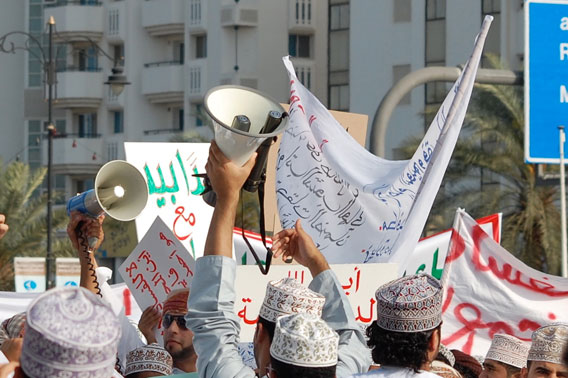Authority forces from the Internal Security Service (ISS) in Oman have been active in targeting pro-reform activists for criticizing the Omani government on social media. After the Arab Spring Uprisings in 2011, Oman intensified the restriction on free expression in the country. Human Rights Watch (HRW) has reported an obvious pattern of repression on free expression, noting that many critics face harassment and threats of ambiguous criminal charges for activities deemed to insult the sultan or the country. Bloggers and online activists are arrested and detained for up to several years for criticizing the authorities’ policies. The Omani courts sentence these activists to prison on the basis of vaguely defined laws that repress freedom of speech.
Hassan al-Basham, a former diplomat and online human rights activist, was regularly sentenced to prison for defending prisoners of conscience and for insulting God and Sultan Qaboos bin Said al-Said. On social media, al-Basham discussed economic, religious, political, and social topics. As a result, he was first arrested on 17 September 2015 by the ISS and sentenced to three years in prison for what was considered offensive social media posts. Due to his deteriorating health, on 17 January 2017, the High Court of Oman revoked the three year prison sentence. Requests for a medical examination of al-Basham were ignored and he sadly passed away while in custody of Omani prisons.
In August 2016, the Omani government ordered the closure of Azzaman newspaper after it published two papers that accused top Omani officials of pressuring the judiciary to change the ruling on an inheritance case. The courts charged the newspaper with violating freedom of expression laws by publishing the reports. The editor-in-chief, Ibrahim al-Ma’mari, deputy editor, Zaher al-Abri, and journalist, Yousef al-Haj, were all arrested after the immediate closure of Azzaman. Al-Ma’mari and al-Haj were charged with misusing the internet by publishing details of a civil case. Al-Abri was charged with using the internet for the dissemination of material and undermining the prestige of the state. The Muscat Court of Appeals ordered the release of al-Ma’mari and al-Haj after reducing their bail to 2,000 riyals each. Al-Abri was also released on a 5,000 riyal bail. Azzaman newspaper was ordered to permanently close on 5 October 2017 by Oman’s Supreme Court.
In 2017, Amnesty International called for the government of Oman to end the harassment of Mohammed al-Fazari’s family. Mr al-Fazari is the founder and editor-in-chief of Muwatin Media Network and has been arrested and detained countless times for insulting the government and undermining the prestige of the state. On 22 December 2014, al-Fazari was subjected to a travel ban and was stopped by security forces at the Muscat International Airport. His passport and identification card were confiscated on the spot. His wife Badriya al-Ma’mari was temporarily detained on 30 January 2017 with her two children at the al-Wajajah border crossing for her husband’s actions. Her passport along with her childrens’ passports were confiscated by government officials. As of 2017, al-Fazari resides in the United Kingdom where he has been granted asylum and protection from the Omani government.
On 14 January 2018, Oman issued a revised penal code that increases the punishment for violating laws that repress freedom of expression. The punishment for committing slander against the sultan has been increased from 6 months in prison to 3-7 years in prison under Article 97. Under Article 269, the penalty for committing blasphemy against Islam has been increased to 10 years in prison. These laws have made it exponentially more difficult for authors like Saeed al-Hashimi and Suleiman al-Maamari to publish books that might speak ill of the government and endanger the lives of human rights defenders and activists that call for the accountability of the Omani government.





